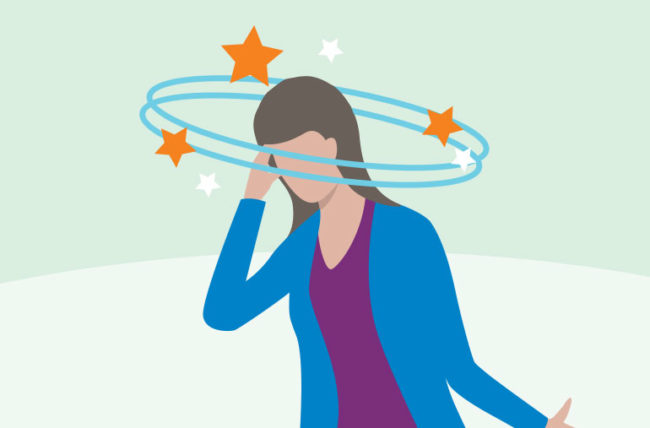Introduction;
.Dizziness and vertigo rank among the most frequent symptoms prompting patients to seek medical attention, comparable to the prevalence of back pain and headaches. For this population, falling can directly result from dizziness, and the risk is heightened in elderly individuals with additional neurological impairments and chronic health conditions. These terms are often used interchangeably, but they refer to distinct experiences.
Dizziness can encompass various sensations, including lightheadedness, unsteadiness, and a feeling of floating. Vertigo, on the other hand, is characterized by a false sense of spinning or movement, as if the surrounding environment is in motion.
A report using data from the Swedish National study on Aging and Care (SNAC) found that in patients younger than 80 years, the prevalence of falls was 16.5% and that of dizziness was 17.8%, whereas in patients older than 80 years, the prevalence of falls was 31.7% and that of dizziness was 31.0%. [3] The younger patients tended to have more specific predictive factors, whereas the older patients tended to have more general ones.
Causes of Dizziness and Vertigo:
Inner Ear Disorders: Benign Paroxysmal Positional Vertigo (BPPV), Meniere’s disease, vestibular neuritis, and labyrinthitis.
Vestibular Migraines: Migraine headaches that manifest with vertigo .
Medication Side Effects: Certain medications can disrupt the inner ear’s balance mechanisms.
Low Blood Pressure: Sudden drops in blood pressure .
Anxiety and Panic Disorders: Psychological factors can contribute to these symptoms.
Cardiovascular Issues: Conditions like arrhythmias and heart disease can cause inadequate blood flow to the brain.
Neurological Conditions: Multiple sclerosis, stroke, brainstem and cerebeller vascular lesions and other neurological disorders can affect balance and perception.
Low blood Sugar : Hypoglycemia can also cause dizziness.
Signs and Symptoms ;
The signs and symptoms of dizziness and vertigo can vary depending on the underlying cause. Some of the most common signs and symptoms include:
- Lightheadedness
- motion intolerance
- Spinning sensation
- Imbalance
- Nausea and vomiting
- Sweating
- Ringing in the ears
- Hearing loss
- Difficulty concentrating
- Fatigue
Time Course of Vertigo ;
The time course of vertigo is important:
Episodic vertigo lasting for several days, accompanied by nausea and the absence of other ear or central nervous system symptoms, is typically attributed to vestibular neuritis, particularly following a viral illness.
Episodic vertigo lasting for seconds, coupled with head or body position changes, is likely due to benign paroxysmal positional vertigo (BPPV).
Vertigo that lasts for hours is probably caused by Meniere disease (if associated with hydropic ear symptoms)
Sudden-onset vertigo lasting for minutes may be attributed to migraine, brain-related issues, or vascular disease, particularly if there are cerebrovascular risk factors present.
Diagnosis ;
Medical History and Physical Examination:
Evaluating symptoms and ruling out other conditions.
Dix-Hallpike Maneuver:
The presence of positioning nystagmus is a characteristic observation in individuals diagnosed with benign paroxysmal positional vertigo (BPPV). It is elicited by moving the patient rapidly from the sitting position to the head-right-down and head-left-down positions while observing and recording resulting nystagmus and symptoms. Avoiding hyperextension of the neck is recommended and should be practiced to prevent potential issues.
Videonystagmography (VNG):
Evaluates eye movements to gauge the functioning of both the inner ear and the central nervous system.
MRI or CT Scan:
Imaging to identify structural abnormalities or neurological causes.
Electronystagmography (ENG):
Records eye movements to evaluate vestibular system integrity.
Caloric testing:
This test measures the response of your inner ear to warm and cold water.
Rotating Chair testing :
This test is particularly valuable for assessing the extent of central vestibular compensation and the remaining vestibular function, especially in instances of bilateral vestibular loss.
Management;
Epley Maneuver:
Treatment for BPPV involving specific head and body movements to reposition displaced particles in the inner ear.

Medications:
It is managed with vestibular suppressants, antiviral medication, and antiemetic medications. Steroids are useful in selected patients. Vestibular suppressants should be employed for a brief duration, typically a few days at most, as they can impede the natural compensatory mechanism of the brain for peripheral vertigo.
Vestibular Rehabilitation:
It is very useful in boosting central vestibular compensation.
Lifestyle Modifications:
Avoiding triggers like caffeine, alcohol, and stress.
Cognitive Behavioral Therapy:
Effective for managing anxiety-related dizziness.
Surgical Interventions:
In severe cases, surgery may be considered for certain conditions.
Physical therapy:
Physical therapy can be beneficial in enhancing balance and coordination.
Don’t try it at home , must visit your healthcare professional if you feel any above mentioned sign and symptoms.
Conclusion;
Dizziness and vertigo can stem from a variety of causes, ranging from inner ear disorders to psychological factors. Recognizing the distinction between these sensations and understanding their underlying causes is essential for proper diagnosis and effective management.
With advancements in medical technology and tailored therapies, individuals experiencing vertigo can find relief and regain their sense of balance and well-being. If you or someone you know is grappling with these symptoms, seeking medical attention and exploring appropriate interventions can pave the way for a more stable and comfortable life.
Frequently Asked Questions (FAQs) ;
What's the difference between dizziness and vertigo?
What causes dizziness and vertigo?
Many factors can trigger them, including: Inner ear problems (e.g., benign paroxysmal positional vertigo (BPPV), labyrinthitis) Migraines Low blood pressure Dehydration Medication side effects Anxiety and inner ear infections Neurological conditions (less common)
When should I see a doctor about dizziness or vertigo?
Seek medical attention if: It's severe or persistent. It comes with other concerning symptoms like chest pain, difficulty breathing, weakness, or speech problems. It worsens after head injury or trauma. You have underlying health conditions.
How is BPPV treated?
Often managed with specific head maneuvers (canalith repositioning procedures) performed by a healthcare professional.
How can I manage anxiety-related dizziness?
Stress management techniques like relaxation exercises, meditation, and therapy can be helpful.
Are there medications for dizziness or vertigo?
Sometimes, medication might be prescribed depending on the underlying cause and your specific symptoms. Always consult your doctor.
What can I do to prevent dizziness or vertigo?
Staying hydrated, avoiding triggers like dehydration and motion sickness, and managing stress can help reduce the risk. However, consult your doctor for personalized advice.
https://rumble.com/v3c1mxg-vertigo-exercises.html










